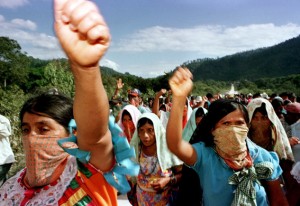the movies of the maya
On the southernmost, crystalline mountains of Mexico, in clouds that gather as low as their ankles, native women in brazen tzutes, bend to collect water at the same limestone springs their Maya ancestors used. With gurgling babes strung fast to their backs, they scale the plateaus of corn, bananas and coffee to gather food, weave, bake bread, raise chickens, learn accounting and shoot movies…
These women belong to Las Abejas, or “The Bees,” a pacifist collective, made up of rural farmers from 48 indigenous communities of Chiapas, who for over 20 years, have resisted oppression by the Mexican government and military, through peaceful demonstrations like fasting and prayer.
Chiapas is a state with a tense history of civil unrest and human rights violations and which the writer Carlos Fuentes once described as so poor that “even the rocks are screaming.”* The indigenous people here are the poorest in Mexico, and the women of The Bees, the most destitute of all. 71% percent of them are malnourished and 50% of them are illiterate. However, with help from organisations like Peace and Diversity Australia (PDA), these women are organising themselves, taking cameras into their own hands and making documentaries about their crusade for independence.
In their latest short film, they share their daunting challenges. In a largely sexist country, the women struggle with a dizzying trifecta of discrimination – they are poor, indigenous and female. Droves of men have migrated from their communities, unable to find employment or a way to provide for a family, leaving social structures imbalanced and women battling for an income to feed their children, even to buy corn, their most basic staple, the price of which has escalated dramatically in the nationwide food shortage crisis. They have no access to running water or electricity. Their lawful rights are easily violated by a justice system that is beyond their means and functions only in the official language of Spanish. Despite their impoverished position, the women’s history as spirited resistors is seen as a threat and they are targeted by a military campaign aimed at disrupting their ability to organise and defend themselves.
The women talk as they work, always fetching firewood, picking coffee beans, knitting and kneading, imposing urgency on every precious daylight hour. Outside their humble homes, armed soldiers are stationed in the dust, as chickens race freely for worms around their feet – a jarring sight in close-knit village life and a heavy reminder of this area’s dark history, the scars of which are no longer fresh on the women’s faces, but deep set behind their eyes and grim smiles.
In 1997, amid the uprising of the Zapatista Army of National Liberation, The Bees protested against the government’s seizure of their lands and natural resources, which rival Saudi Arabia for oil potential. At the front of the resistance were the women. They paid dearly for it. During a church prayer service, 45 members of the Bees, mostly women and children were murdered by a paramilitary troop, in a massacre that shocked Mexico and the world. Nearby government soldiers ignored the attack and later tampered with the crime scene. Four of the victims were pregnant women, shot and stabbed in the belly, and so The Bees put the death toll at 49.
As they relate their stories, the camerawork often grows shaky and the framing, amateurish but this only stresses the authenticity of the documentary. The personal note is resounding; the camera is like corn dough or woolen threads to these women; another craft to work to help preserve their culture. Filmmaking is a powerful form of peaceful protest, of art against violence, aligning itself with the women’s tactics and manifesto.
The resolve of the women of The Bees is firm. Woman after woman devotedly expresses a hearty mistrust towards government and military. They refuse government handouts, convinced of their obligatory nature and promotion of laziness amongst their people. Instead they want independence, most importantly financial. One woman’s expression grows grave as she explains the debt incurred when forced to pay high interest on loans for emergency medicine when she or her children fall ill. When PDA first met with these women to ask what their biggest worry was, they all said the access to cash.
So in 2010, the women began a bold venture: they created their own bank. Managed by women of 14 communities, the capital was provided from a year of earnest saving by the women themselves, matched peso for peso by worldwide donations. Now small micro-credit loans are approved to these women, aimed at projects that promote an income or as an emergency fund for health and hygiene. The modest interest accrued on loans is invested back into the bank to create more money for the women to access.
The effect has been hugely empowering. Making their own films has given the women a voice, their own voice, that has global reaching. Here the democratisation of film that has occurred through technological advancement and civilian access hits its most valid and useful stride. Self-financing their own loans has provided the women with a small, but crucial basis for financial freedom. These women are nothing if not resilient. And that’s their goal, not to be looked after, but to have dignity, to be self-sufficient, independent and equal.
To support the women or see more documentaries visit – http://www.peaceanddiversity.org.au
*as noted by investigative journalist Ann Louise Bardarch in Mexico’s Poet Rebel (1994)
(Image Credit: Oriana Eliçabe)


